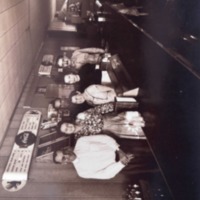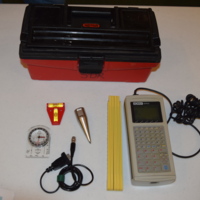Browse Exhibits (3 total)
Innovations in Customer Service

Businesses in the customer service industry have consistently evolved with the changing times to better exhibit corporate policy, technological shifts, and customer engagement. These innovations can be seen in the type of businesses that open and close according to supply and demand, the different equipment businesses use, and the change in the ways that products are produced and promoted to the public. However, it is curious to discover what explicitly sparks a change in policy, prompting innovation and change materialistically in stores and restaurants. As technology shifts, what components of everyday life in customer service fade away during this process?
This exhibit includes items that exemplify some of these changes and the different motives businesses had for creating innovation in their customer service design. From a local cafe in Southern Illinois to a country-wide movie theater chain, these items will answer the question as to what it is that encourages businesses to innovate their customer service initiatives.
Integration into the Workplace

It is necessary for jobs to integrate their employees into the workplace, its rules and regulations, and its culture. Depending on a job and its requirements, there are a variety of ways—some more involved than others—in which workers can become accustomed to or a part of workplace practices. Recording such methods in an archive allows for the recognition of the diversity of these practices and how they have shifted over time.
This collection represents papers and documentation that welcome and orientate individuals to the workforce. Included in this collection are orientation documents that establish the Andersen Consulting dress code in the 1990s. This dress code details the standards of appearance and dress for women working for Andersen Consulting. Next is a stock (share) of ownership in the Boston Celtics from the late 1980s. This stock was available for purchase in the gift shop of the Boston Garden, and is a true share of ownership for the Celtics. Third is a license given to an individual to welcome them to the Aiken County Sheriff's Department. This particular license is for the Detention Division of the Aiken County Sheriff’s Department, which covers Aiken’s detention center. The fourth and final item in this collection is a program for the inauguration of the Illinois Senate from January 2023. This program lists all the Senators of the 103rd Illinois General Assembly.
References:
Basketball Reference. “Boston Celtics Franchise Index.” Accessed November 7th, 2024. https://www.basketball-reference.com/teams/BOS/.
Charles Schwab. “What Are Stocks.” Accessed November 8th, 2024. https://www.schwab.com/stocks/understand-stocks.
Keck, Patrick M. “State legislators sworn in, 103rd Illinois General Assembly begins.”The State Journal Register (Springfield, IL), Jan 12, 2023. https://www.sj-r.com/story/news/politics/state/2023/01/12/state-legislators-sworn-in-103rd-illinois-general-assembly-begins/69798849007/.
Lang, Robert M. “The Hidden Dress Code Dilemma.” The Clearing House 59, no. 6 (1986): 277–79. http://www.jstor.org/stable/30186540.
Examining the Earth: Careers in Geology and Archaeology

Geology and archaeology may appear to be unrelated fields, but they have a strong relationship. Both studies use tools (like the ones exhibited) to examine Earth’s features. Archeologists must have an awareness of geological sciences. Understanding materials used in the past, how to date Earth’s features, and using geological knowledge to reconstruct the past can help archaeologists study past cultures more authentically and accurately. In turn, geologists must be familiar with archaeological sciences as well. When doing field work, it is important for geologists to be able to recognize culturally significant items and preserve them. Blending the two studies into geoarchaeology benefits our understanding of the Earth and its past.
The primary objective of geological technicians is to identify and extract the Earth’s natural resources. The typical tasks of a geological technician include the installation and maintenance of equipment, the gathering an preparation of samples for lab analysis, conducting tests to determine the content of field samples, and the recording of test data for compilation in reports and databases. The majority of geological technicians work in fields related to architecture and engineering, but some work in the field of mining and the extraction of oil and natural gas. Only about 1% of geologists work in the field of transportation management. While some institutions prefer a bachelor’s degree, one can generally enter the field with an associate’s degree. According to the US Bureau of Labor Statistics, the 2023 median pay for geologists was $53,440 per year, and the field is projected to grow at a rate of 3% over the next decade.
The main goal of anthropologists and archeologists is to study the behavior, origins, and development of human civilization by studying the culture and characteristics of civilizations in the past and present. They are tasked with writing and presenting field research findings, designing and coordinating data collection for a particular region or project, and advising organization on the cultural impact of policies, programs, and products. Archeologists work in various settings, such as museums, historical sites, and laboratories, with the largest employers being research and development at 27%, and the smallest employer being academic institutions at 5%. Typically, an archeologist should be expected to have a master's degree, with some positions even requiring a Ph.D. According to the US Bureau of Labor Statistics, median pay for anthropologists and archeologists was around $63,800 per year, and the job outlook is expected to grow 8% from 2023 to 2033.
That all sounds cool, but how does it affect me? Geology and archeology impact our day-to-day lives. Archaeologists put together left-behind clues to help us understand the past. Preserving materials found in field work ensures that the stories of material culture will be told for decades to come. Without archaeology, our knowledge of how cultures have changed over time would be different.
Geology has a more direct influence in our modern lives. First of all, it keeps us safe. Geologists study soil, water sources, seismic activity, and other landscape conditions. That helps farmers understand soil health for crops, locate safe drinking water, prepare humans for natural disasters, and assess infrastructure safety, respectively. Geologists also research which minerals should be used in construction, phone manufacturing, and health supplements. Geology takes humanity into the future as well. Experimenting with natural resources gives an understanding of climate change, and how we can use new renewable resources for good.
“Anthropologists and Archeologists.” U.S. Bureau of Labor Statistics. U.S. Bureau of Labor Statistics, n.d. Accessed November 13, 2024. https://nam11.safelinks.protection.outlook.com/GetUrlReputation.
Ashworth, Amy. “How Geology Affects Your Everyday Life.” Association of Environmental and Engineering Geologists. Association of Environmental and Engineering Geologists, n.d. Accessed November 12, 2024. https://www.aegweb.org/index.php?option=com_dailyplanetblog&view=entry&year=2021&month=01&day=18&id=14%3Ahow-geology-affects-your-everyday-life.
Dodge, Amanda. “Tech in the Sediment: 12 Ways Archaeologists Use Technology.” Ozobot. Last modified August 29, 2024. Accessed November 12, 2024. https://ozobot.com/ways-archaeologists-use-technology/.
Dowey, Natasha. “5 Reasons Why Studying Geoscience Can Help Save the Planet.” Geoscience for the Futuer. Last modified April 14, 2021. Accessed November 12, 2024. https://geoscienceforthefuture.com/studying-geoscience-can-save-the-planet/.
“Geological and Hydrologic Technicians.” U.S. Bureau of Labor Statistics. U.S. Bureau of Labor Statistics, August 29, 2024. Last modified August 29, 2024. Accessed November 12, 2024. https://www.bls.gov/ooh/life-physical-and-social-science/geological-and-petroleum-technicians.htm#tab-1.
“Value of Archaeology.” Pennsylvania Historical and Museum Commission. Pennsylvania Historical and Museum Commission, n.d. Accessed November 12, 2024. https://www.phmc.state.pa.us/portal/communities/archaeology/resources/value-archaeology.html.
“Why Geology Matters.” NC DEQ. North Carolina Department of Evironmental Quality, n.d. Accessed November 12, 2024. https://www.deq.nc.gov/about/divisions/energy-mineral-and-land-resources/north-carolina-geological-survey/geoscience-education/why-geology-matters.
